|
|
|
Sort Order |
|
|
|
Items / Page
|
|
|
|
|
|
|
| Srl | Item |
| 1 |
ID:
103745


|
|
|
|
|
| Publication |
2011.
|
| Summary/Abstract |
What would a non-Eurocentric European Neighbourhood Policy (ENP) look like? Starting off with this perhaps "impossible" question, the first half of the article traces recent shifts in thinking about ENP on the part of EU administrators and intellectuals who argue for a strengthened and reinvigorated neighbourhood policy around the Southern Mediterranean, Middle East and CIS countries, through what has now been termed a differentiated "ENP plus". Parsing recent EU reports, opinions and speeches, it isolates a crucial ambiguity within this re-framed policy landscape regarding ENP's relationship to the previous round of EU expansion, which has important political consequences for how ENP currently envisions the thorny problem of transition within the neighbourhood. The second half of the article draws on a parable by the Argentinean novelist-philosopher Jorge Luis Borges to frame more sharply the problem of cartographic representation embedded within ENP. Applying the neologism of a "Borgesian frontier" to the space of the European Neighbourhood, the paper concludes by suggesting some potential pathways for re-imagining this space in ways that work along with, rather than are "blind" to, contradictions inherent to Europe's newly minted external borderland. At stake, the article argues, is a politics that can properly re-envision regions of the world located at the limits of Europe's sovereign spatial imagination.
|
|
|
|
|
|
|
|
|
|
|
|
|
|
|
|
| 2 |
ID:
103728


|
|
|
|
|
| Publication |
2011.
|
| Summary/Abstract |
In the process of globalization it is border culture that ultimately sustains linkages, assures continuity and maintains prosperity between bounded states. In this essay we explore how border culture works, and how the conceptualization of border culture advances our understanding of how borders work. Our approach is to establish a place for the consideration of culture in the more extensive debates about border theory through a focus on the Canada-U.S. border, and how this border advances our knowledge of border culture and border theory.
|
|
|
|
|
|
|
|
|
|
|
|
|
|
|
|
| 3 |
ID:
103726
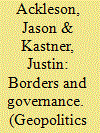

|
|
|
|
|
| Publication |
2011.
|
| Summary/Abstract |
The contemporary dynamics of states, borders, and markets suggest the need for non-traditional methods of regulation and international cooperation in areas such as border inspections and management. The emerging literature on cross-border regions and multi-level governance suggests a framework to understand this development within the general transformation of states under globalisation. To explore these ideas, in this article we focus on the arena of health regulation and the international agricultural and food trade. Multilateral bodies such as the World Trade Organization (WTO), the World Organization for Animal Health (OIE), and the International Plant Protection Convention (IPPC) have endorsed the policy concept of "regionalisation" as a means by which states can preserve trade relations when sanitary (human or animal health) or phytosanitary (plant health) hazards threaten a country's trading status. In this paper, two cases - one historical and one contemporary - illustrate that regionalisation offers a largely functional application of multi-level governance to enhance regulatory and trade capacity. We conclude that governance changes indicated by regionalisation may provide further evidence for the transformation of borders, regions, and states in an era of globalisation.
|
|
|
|
|
|
|
|
|
|
|
|
|
|
|
|
| 4 |
ID:
103725
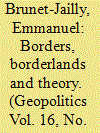

|
|
|
| 5 |
ID:
103739
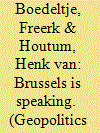

|
|
|
|
|
| Publication |
2011.
|
| Summary/Abstract |
The European Neighbourhood Policy (ENP) was presented as the EU's strategic response in order to deal with the new situation following the enlargement of the European Union in 2004. According to the EU, these changing circumstances have led to new rationales: 1) coping with its new external borders and neighbours and 2), finding a solution for a further enlargement problem. Both rationales are drawn out of strategic interest avoiding potentially damaging consequences on stability and development. Moreover, new inducements for multilevel cooperation were seen as necessary in order to 'include' the neighbouring states and create a prosperous and stable 'Ring of friends'. The ENP has the objective to contribute to internal transformation and to further the process of 'Europeanisation'. Europeanisation is explained by the EU as a normative process of sharing European values made concrete through policies of conditionality and socialisation of neighbouring states. This process of expanding 'Europeanisation' beyond the EU borders is inspired by an ambiguous and conflicting geopolitics that the EU applies as a strategic instrument. Most notably, this is emphasised by the fact that the ENP on the one hand creates an image of an inferior neighbour that urgently needs to move towards European standards and on the other hand produces a speech politics of mutuality and dialogue.
Through the study of EU speeches, communications and documents, we will argue that the rationales behind the ENP suggest a closure of the European Union and allow for neo-colonial interpretations by which pre-defined policies are to be accepted and pre-defined European values are seen as superior to neighbouring local values. This development is both undesirable and harmful. Europe is increasingly re-created as a bounded political entity institutionalised through hierarchical treaties and acts with friends, special friends, and reluctant, unwilling neighbours. In doing so, the EU faces a significant chance of alienating its neighbours and damaging cultures and societies by asymmetrical imperial power-policies based on self-created values. Paradoxically then, ENP that was set up to create good neighbours, risks producing what it wishes to protect from, angry neighbours.
|
|
|
|
|
|
|
|
|
|
|
|
|
|
|
|
| 6 |
ID:
103750
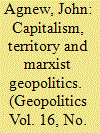

|
|
|
|
|
| Publication |
2011.
|
| Summary/Abstract |
This response traces the importance of ideas and politics versus economic determinism in developing a critical approach to geopolitics particularly in questioning the necessary relationship between territory and capitalism. From this perspective, and contra to "Marxist geopolitics," spatial-political form does not follow from economic function. To argue so leads to an intellectual and political dead end.
|
|
|
|
|
|
|
|
|
|
|
|
|
|
|
|
| 7 |
ID:
103748


|
|
|
|
|
| Publication |
2011.
|
| Summary/Abstract |
Undead, unkillable and uncannily, unceasingly trendy, 'geopolitics' strikes again. Marxist geopolitics could have been a good idea - for Marxists at least. This version doesn't work for two reasons: first, its emphasis on the inter-relationship between territory, capitalism and power makes it virtually indistinguishable from Marxism writ large; and second, it re-legitimates some of the familiar yet noxious tropes of classical geopolitics.
|
|
|
|
|
|
|
|
|
|
|
|
|
|
|
|
| 8 |
ID:
103736


|
|
|
|
|
| Publication |
2011.
|
| Summary/Abstract |
This paper presents a political ecology approach to the study of borders through consideration of a lemon's travels in contemporary North American border space. Following discussion of recent work on the dynamic, multi-scalar, and process-based character of modern borders, I suggest that such critical approaches could be usefully augmented by drawing on ideas about socio-material networks advanced by Bruno Latour. By adopting a political ecology framework, border scholars would be able to consider more fully the materiality of borders and bordering processes. Through the example of the lemon, I demonstrate that in constructing the fruit as a particular socio-material artifact that embodies multiple threats to US national space, it and its carrier become implicated in the regulation of political-economic and geopolitical networks that are seemingly far removed from the object of concern.
|
|
|
|
|
|
|
|
|
|
|
|
|
|
|
|
| 9 |
ID:
103749
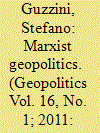

|
|
|
| 10 |
ID:
103727
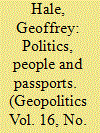

|
|
|
|
|
| Publication |
2011.
|
| Summary/Abstract |
This article examines the politics of border management in North America, particularly the United States' northern border with Canada, as a by-product of competing and overlapping domestic political discourses. It considers these perspectives in the context of US state-society relations and cross-border relations with Canada, focusing particularly on a case study on expanded requirements for personal identification for domestic and international travellers by Americans and their North American neighbours under the "Western Hemisphere Travel Initiative" (WHTI). It demonstrates the capacity of domestic and cross-border interest groups to mobilize political and bureaucratic support through American political processes to modify US domestic security rules, and the factors which contributed to these policy shifts.
|
|
|
|
|
|
|
|
|
|
|
|
|
|
|
|
| 11 |
ID:
103744


|
|
|
|
|
| Publication |
2011.
|
| Summary/Abstract |
One of the aims of this article it to clarify the nature of the debate over 'civil society' and its relationship to the state. It begins by suggesting that the EU's borderland provides a context in which deep-rooted 'Western' and 'Eastern' understandings of state and civil society meet and overlap. The second section outlines the geo-political reshaping of the 'Neighbourhood'. It concentrates on the influence of non-EU actors, notably Russia, complementing the EU-focused literature on the subject. The third section elaborates the consensus in the literature on the weakness of civil society in the EU 'Neighbourhood'. This is followed by a discussion of 'Western' debates over the role and significance of civil society. This discussion suggests that the 'export' of a Western model eastwards begs many questions about which particular model is to be promoted. It concludes that the precise characteristics of state-civil society relationship remains central to the prospects for enhancing civil society co-operation.
|
|
|
|
|
|
|
|
|
|
|
|
|
|
|
|
| 12 |
ID:
103737


|
|
|
| 13 |
ID:
103741


|
|
|
|
|
| Publication |
2011.
|
| Summary/Abstract |
Civil society observations of the EU's geopolitical impacts on its immediate neighbourhood provide a nuanced 'ground-up' perspective that eschews historically deterministic interpretations of the EU's role in the world. While this article is limited to Eastern Europe, it nevertheless highlights some of the challenges facing the EU's visions of 'Neighbourhood' as multilateral and multilayered regional co-operation. After a brief theoretical introduction, the article first characterizes the EU's geopolitics as a dual project of consolidation and ideational projection; that is as two projects of re-ordering - re-territorializing - interstate relationships. It then addresses three specific and interrelated questions with regard to civil society: 1) how do the EU and its policies affect civil society co-operation agendas and practises, 2) to what extent does civil society participate in the co-development of Neighbourhood Policy and 3) how do civil society actors perceive the role of the EU in promoting cross-border and regional co-operation within the 'Neighbourhood'? One central issue in developing these questions is that of establishing 'common' European values as a condition for successful co-operation. Civil society actors must simultaneously operate within different, often competing, socio-political contexts. A balance between situational ethics and more generally accepted notions of (European) values is thus essential.
|
|
|
|
|
|
|
|
|
|
|
|
|
|
|
|
| 14 |
ID:
103752


|
|
|
| 15 |
ID:
103729


|
|
|
|
|
| Publication |
2011.
|
| Summary/Abstract |
This article considers the emerging security dispositif, particularly in terms of the growing reliance on risk, risk management, and technologies of risk in relation to contemporary border security. With the ongoing application of biometrics in the contemporary mobility regime in mind, the article argues that the use of these technologies, in combination with the widespread reliance on risk management, contributes to the re-imagination of borders and the bodies that cross them. The contention that the securitisation of mobility and bodies that results from this emerging logic of rule and the accompanying commitments to specific identification technologies (biometrics), also relies on a nuanced and complex reading of securitisation well beyond the caricatured accounts of the Copenhagen School.
|
|
|
|
|
|
|
|
|
|
|
|
|
|
|
|
| 16 |
ID:
103751


|
|
|
| 17 |
ID:
103747


|
|
|
|
|
| Publication |
2011.
|
| Summary/Abstract |
The article argues for a Marxist geopolitics that moves beyond both critical geopolitics and the discredited classical geopolitics. It underlines the valorisation of territory by capital across three levels of abstraction: that of social infrastructure, class conflict and ground-rent proper. The recent Russian-Ukrainian gas wars are briefly analysed by way of illustrating the application of this distinctive approach to geopolitics.
|
|
|
|
|
|
|
|
|
|
|
|
|
|
|
|
|
|
|
|
|